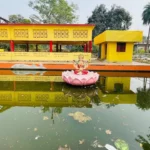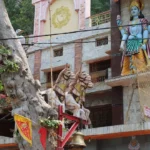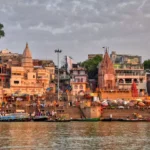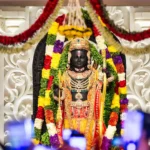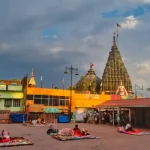How Varanasi Got Its Name: Unraveling the Mystery Behind the Ancient City’s Origins
Shiva himself named the city after two rivers – the Varuna and the Assi. The Varuna and Assi rivers once flowed through the city, and their confluence was considered to be a sacred spot. The city was thus named “Varanasi,” which means “the land between the Varuna and the Assi.”

Another popular legend attributes the city’s name to a mythological figure named Varuna, who is associated with the Varuna River. Varuna was said to have meditated at the confluence of the Varuna and the Assi rivers and is believed to have been instrumental in the city’s founding.
Premium Kashi-Prayag Yatra
Prayagraj is revered for the holy Triveni Sangam and the world-famous Kumbh Mela, where devotees gather to cleanse their souls. Varanasi, also known as Kashi, is the eternal city of Lord Shiva, renowned for its ancient ghats, Ganga Aarti, and belief in attaining moksha.
- Private Sunrise & Sunset Boat Rides on Ganga
- VIP Darshan Assistance at Kashi Vishwanath
- Holy Dip at Triveni Sangam with Private Boat
Historical Accounts of Varanasi’s Name
Apart from the legends, several historical accounts shed light on how Varanasi got its name. According to some scholars, the name “Varanasi” is derived from the Sanskrit word “Varanasi,” which means “the city of the virtuous.” This name is believed to have been given to the city due to its association with spirituality and religion.

Another theory suggests that the city was named after the ancient kingdom of Varnasen, which is believed to have existed in the area. The kingdom was said to be ruled by a king named Varnasen, and the city was named after him.
Varanasi’s Name Through the Ages
Over the centuries, Varanasi’s name has undergone several changes. In ancient times, the city was known as Kashi, which means “the city of light.” This name was given to the city due to its association with knowledge, learning, and spirituality.

During the Mauryan era, the city was known as Baranasi, which is believed to be a corruption of the Sanskrit word “Varanasi.” The name Baranasi was used by Buddhist and Jain scholars to refer to the city, and it gained popularity during this period.
During the Mughal era, the city was known as Benares, which is a corruption of the Sanskrit name “Varanasi.” The name Benares was used by the British during colonial times and is still used by some people today.
Why Choose Premium?
Experience spirituality with unmatched comfort
- Private Boat
- VIP Darshan
- Premium Transport
- Luxury Stays
The Significance of Varanasi’s Ghats
The ghats of Varanasi have played a significant role in the city’s cultural and spiritual heritage. They are used for a variety of activities, including bathing, cremation, religious ceremonies, and social gatherings. It is believed that taking a dip in the holy waters of the Ganges at these miraculous ghats can purify the soul and wash away their sins.
Each ghat has its own unique history and significance, and many of them are associated with mythological stories and religious beliefs. They are also popular tourist attractions and draw visitors from all over the world.
Conclusion
In Conclusion, Varanasi’s name has a rich and fascinating history that is steeped in legend and myth. From Lord Shiva to ancient kingdoms and religious scholars, there are many stories and theories about how the city got its name.

While the exact origin of the name may be unclear, what is certain is that Varanasi’s name is closely linked to its rich cultural and spiritual heritage. The city has been a beacon of knowledge, learning, and spirituality for centuries, and its name is a testament to its enduring legacy.
Whether you call it Varanasi, Kashi, Baranasi, or Benares, the city remains a fascinating destination for travelers and pilgrims alike. Its narrow lanes, ancient temples, and bustling ghats offer a glimpse into India’s rich past and vibrant present.
By visiting Varanasi and exploring its many wonders, you can experience the magic of this ancient city and discover the stories and legends that have shaped its name and its history.
Tour Details FAQ
Everything you need to know before booking
Where does the tour start and end?
The tour usually starts with a pickup from Varanasi Airport (VNS) or Railway Station and ends at either Varanasi or Prayagraj Airport/Station, depending on your flight connectivity.
Is the holy dip at Sangam included?
Yes, we provide a private boat to take you to the Sangam point. Changing tents/facilities are available on the ghats or boats.
Can we add Ayodhya to this package?
Yes, we provide a private boat to take you to the Sangam point. Changing tents/facilities are available on the ghats or boats.











